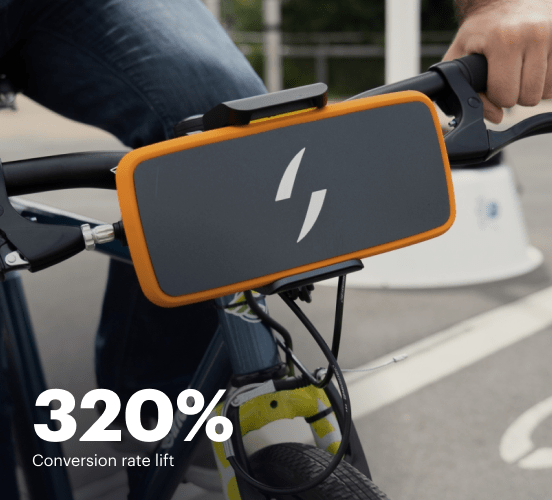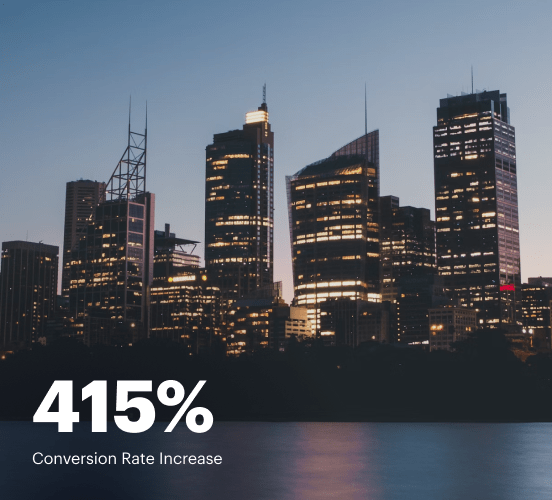Typeform vs. WordPress: the best platform for a seamless web experience
Discover how Typeform compares to WordPress regarding features and usability. Find out which platform provides the competitive advantage your business deserves.
Get startedSee how Instapage stacks up against the competition
| Feature | Instapage | Other builders |
| Drag-and-Drop Tools | ||
| Conversion-optimized templates | ||
| Manual and AI-powered A/B Tests | ||
| AI content suggestions | ||
| Popups and sticky bars | ||
| Canvas and grid blocks | ||
| Reusable and global elements | ||
| Form and popup builders | ||
| Built-in Heatmaps | ||
| Central analytics dashboard | ||
| Ad-to-page personalization and collections | ||
| Contacts, lists, and email | ||
| Dedicated, full-service CRO experts | ||
| Enterprise-ready platform |
Leading the way in building high-performing landing pages





Why Instapage is the smarter choice for your campaigns
Get everything you need to build, scale, and optimize high-converting landing pages—without coding.
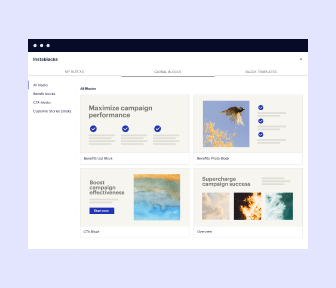
Easier page building without coding
Instapage offers a flexible and seamless page creation experience with a library of 500+ conversion-focused layouts, Instablocks®, a drag-and-drop builder, and AI content generation. With technologies like Thor Render Engine®, you can create on-brand, mobile-responsive landing pages that load quickly and start converting during initial visitor clicks.

More insights — better results
Instapage lets you see in detail how each landing page experience and variation is performing so you can make targeted changes that boost page conversions. Use heatmaps for a better understanding of on-page activities, run A/B tests and AI-assisted experiments, and then track and evaluate results within robust analytics dashboards.

More personalized experiences
Instapage lets you quickly create high-performing landing pages tailored to each of your ad campaigns. Deliver personalized experiences for distinct audiences using dynamic text replacement. Effortlessly align specific advertisements to unique pages with AdMaps. Monitor audience-level metrics using our advanced data tools.
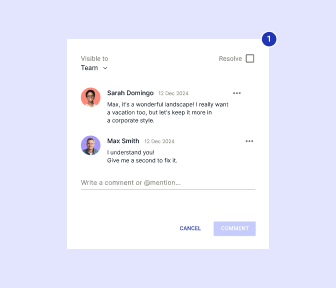
Built-in collaboration
Instapage collaboration capabilities bring your entire team together to speed up the process of landing page review, approval, and launch. No more frustrating and unnecessary revisions or edits scattered across emails. Provide instant feedback, conduct real-time page edits, and securely share your pages with outside stakeholders.

Free up time for your business
Invest time into business growth, not busy work. Launch landing pages faster with reusable forms and templates. Build once, reuse forever.
Explore all integrations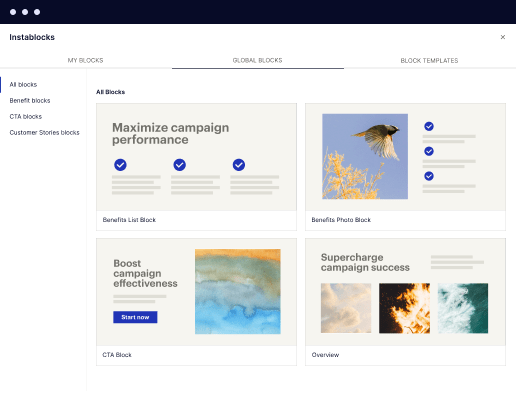
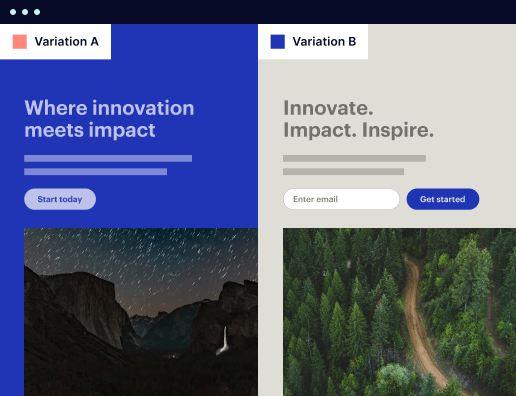
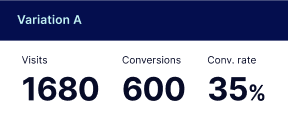
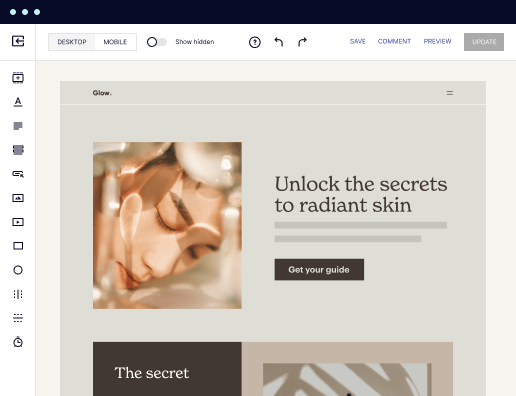

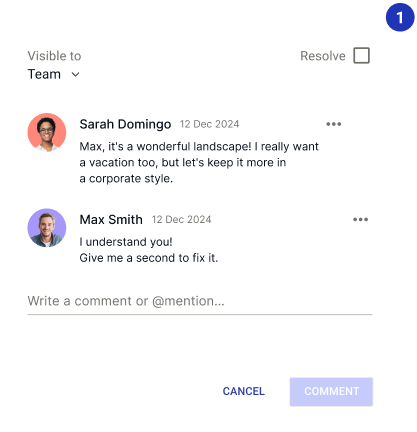

Easier page building without coding
Instapage offers a flexible and seamless page creation experience with a library of 500+ conversion-focused layouts, Instablocks®, a drag-and-drop builder, and AI content generation. With technologies like Thor Render Engine®, you can create on-brand, mobile-responsive landing pages that load quickly and start converting during initial visitor clicks.
More insights — better results
Instapage lets you see in detail how each landing page experience and variation is performing so you can make targeted changes that boost page conversions. Use heatmaps for a better understanding of on-page activities, run A/B tests and AI-assisted experiments, and then track and evaluate results within robust analytics dashboards.
More personalized experiences
Instapage lets you quickly create high-performing landing pages tailored to each of your ad campaigns. Deliver personalized experiences for distinct audiences using dynamic text replacement. Effortlessly align specific advertisements to unique pages with AdMaps. Monitor audience-level metrics using our advanced data tools.
Built-in collaboration
Instapage collaboration capabilities bring your entire team together to speed up the process of landing page review, approval, and launch. No more frustrating and unnecessary revisions or edits scattered across emails. Provide instant feedback, conduct real-time page edits, and securely share your pages with outside stakeholders.
Free up time for your business
Invest time into business growth, not busy work. Launch landing pages faster with reusable forms and templates. Build once, reuse forever.
Explore all integrationsGet started with Instapage in a few steps
-
Create your Instapage account
Start with Instapage by signing up via Google or your email. You'll get access to a free 14-day trial to discover Instapage capabilities. Feel free to cancel anytime during the 14-day trial if you decide that our product is not suitable for your business. -
Build and personalize your page
Create your first landing page from scratch or choose a template from 500+ customizable layouts. Use the drag-and-drop builder to add page elements, fonts, and backgrounds, refine content with AI, or add custom HTML, Javascript, and CSS. -
Review and make edits
Collaborate on page designs and streamline review processes. Invite your team members and stakeholders to review, edit, and provide feedback on your landing page. Collaborate knowing your page is confidential and only accessible to authorized users. -
Publish and track page performance
Publish your page to a domain or custom URL. Connect your pages to the ads you've created and track page performance within the analytics dashboard, run A/B tests and AI experiments, analyze results, and continuously optimize your landing page to maintain high conversions.
Typeform vs. WordPress: The Great Platform Battle with a Surprise Twist
Navigating the realm of online tools can feel like stepping into a boxing ring where each contender is vying for the championship belt of digital marketing. Among these contenders, Typeform and WordPress stand out, each armed with their unique strengths and charms. Typeform dazzles with its interactive forms that not only engage users but also simplify data collection, while WordPress boasts its versatility and extensive plugin library. As we size up these two heavyweights in our analysis, it’s worth noting that another contender, Instapage, lurks in the shadows, readying itself to join the fray. This article pits Typeform and WordPress against each other and unpacks their features, usability, support, pricing, and the added value that Instapage brings to the digital marketing table. Buckle up as we jump into this matchup where the stakes are high and the options are many.
Meet the Titans of Digital Solutions
In the left corner, we have Typeform, a platform renowned for revolutionizing the way we gather information through beautifully designed, interactive forms. Its easy-to-use interface has captured the hearts of marketers focused on enhancing their lead generation processes. On the right, WordPress stands tall, an ever-evolving content management system that has powered millions of websites worldwide. While it may have started as a blogging tool, its growth into an all-encompassing digital platform demonstrates its adaptability in the fast-paced online environment. With thousands of themes and plugins at its disposal, WordPress continues to cater to the diverse needs of users, from personal blogs to large eCommerce websites. But wait—there’s a surprise contender waiting in the wings! Instapage brings yet another layer to our discussion with its powerful landing page capabilities. It excels in maximizing conversions and customizing experiences, making it an invaluable partner for businesses that prioritize online growth. Just imagine the arena bustling with energy as Typeform and WordPress take their positions, but Instapage could easily turn the tide in this match-up.
Feature Face-off: What Sets Them Apart?
When it comes to the features they offer, Typeform and WordPress are ready to throw punches with their unique abilities. Typeform shines with its stunning design capabilities, allowing users to create forms that are not only functional but visually appealing. Its interactive nature engages users in a conversation-like manner, making it ideal for surveys and feedback collection. WordPress, on the other hand, takes a different approach with its extensive customization options, enabling users to tweak their websites to perfection using thousands of plugins and themes. While both platforms are impressive in their own rights, it’s worth mentioning that Instapage is warming up in the wings with its unique suite of tools specifically designed for creating optimized landing pages. As we dive deeper into this duel, we’ll explore what each platform has to offer, leading us to a clearer understanding of their strengths and weaknesses.
User Experience Showdown: Simplicity vs. Versatility
User experience plays a pivotal role in choosing the right digital tool, especially for those just beginning their marketing journey. Typeform puts a strong emphasis on user-centric design, making it incredibly easy to create engaging form experiences. As you navigate through its options, it feels less like maneuvering through a complex system and more like enjoying a guided tour. For beginners, this means a shorter learning curve. On the flip side, WordPress caters to both novices and experts, offering a rich variety of themes and plugins. However, its depth can sometimes feel overwhelming for new users. This duality makes WordPress a treasure trove for those seeking customization but requires a bit of a learning adventure for newcomers. As we compare usability, it’s crucial to recognize that the ideal choice will depend on individual needs and technical comfort levels.
Typeform's Features Unleashed:
- Interactive and visually engaging forms
- Customization options to align with brand aesthetics
- Real-time feedback features to improve user experience
- Integration with other marketing tools for streamlined data management
- User-friendly analytics dashboard for form performance tracking
WordPress's Feature Arsenal:
- Extensive library of themes for diverse website designs
- Plugins that cater to SEO, eCommerce, and more
- Robust content editor with multimedia support
- Community support through forums and tutorials
Common Ground: Strengths Shared by Both Platforms
- User-friendly interfaces that cater to varying skill levels
- Support for mobile-friendly design approaches
- Integration capabilities with popular marketing tools
- Comprehensive analytics tools for tracking performance
- Built-in SEO features to enhance online visibility
- Strong focus on user engagement and interaction
As the judgment rings in, it’s clear that both platforms enter the arena equipped with robust features tailored to different audiences. However, let’s not overlook Instapage, which might just be the ultimate secret weapon. Its ability to create dedicated landing pages designed for conversions sets it apart as a serious contender capable of outshining both Typeform and WordPress in specific scenarios.
Performance Showdown: Speed and Responsiveness in Action
In the world of online marketing, performance often makes or breaks user experience. The first impression users get when visiting a page largely hinges on loading speeds, which can feel dishearteningly slow when pages load like molasses in winter. Typeform maintains an edge with its lightweight forms that load quickly, ensuring a seamless experience for users. In contrast, WordPress performance can vary significantly depending on the chosen theme and installed plugins. Optimizing WordPress sites requires some technical know-how but rewards users with flexibility and the potential for high performance. Furthermore, mobile responsiveness is also critical in our digital-first world. Typeform naturally shines in this area as its forms adapt readily to screen sizes, while many WordPress themes are designed with mobile in mind but require careful selection. Striking a balance between speed and aesthetic is essential, and those interested must weigh their choices carefully.
Customer Support Landscape: The Heroes Behind the Screens
When navigating the complexities of digital tools, robust support can feel like a breath of fresh air. Typeform offers dedicated customer assistance and a rich repository of resources, including tutorials and forums, making troubleshooting more manageable. Meanwhile, WordPress benefits from a vast community of users, offering valuable insights and expert advice, though direct support may vary depending on whether users have chosen a self-hosted or managed solution. This leads to a support experience that can range from fantastic to frustrating, especially for those who are not technically inclined. Regardless of the choice, both platforms provide avenues for users to seek help, ensuring that no one must navigate their journey alone.
Pricing Showdown: Finding Value in the Ring
Typeform's Pricing Advantages:
- Flexible pricing plans tailored to different needs
- Transparent details on what each plan offers
- Pay-as-you-go options for sporadic users
- Easy upgrade paths as needs grow
WordPress's Pricing Perks:
- Free to use in its basic form with self-hosting options
- Various hosting costs to match different budgets
- Plugins often have free versions to start
- Potential for substantial savings with community resources
In synthesizing the pricing strategies of both platforms, it's important to recognize their varying approaches. Typeform offers modes that scale with users' demands, while WordPress provides a free entry point, though costs can accumulate based on needed functionalities. But let’s spotlight Instapage for a moment—its value proposition stands out in terms of flexibility and organization, making it a superb choice for businesses serious about conversion optimization.
Looking closely at the pricing plans reveals a transparent structure, spotlighting how users can get what they pay for while also highlighting hidden costs that can emerge unexpectedly. The ticket price might be appealing, but it’s essential to recognize the complete picture when investing in one of these platforms.
And Then, There's Instapage: The Game Changer
Enter Instapage, the often-overlooked hero of landing page creation. With its powerful focus on conversion optimization, Instapage whisks users into an environment where building tailored landing pages is practically second nature. Its unique offerings include A/B testing, a myriad of customizable templates, and seamless integration with various marketing tools. Instapage's commitment to user success and analytics provides marketers with the insights they need to drive their campaigns effectively. When compared to Typeform and WordPress, Instapage presents itself as a formidable alternative, especially for those focusing on targeted marketing outcomes. As we conclude this exploration, let’s remind ourselves that in the arena of digital tools, having options is invaluable; finding the right fit can make all the difference in your journey.
As we wrap up this face-off between Typeform, WordPress, and the ever-impressive Instapage, it’s clear that informed choices empower businesses to reach their goals. Consider what matters most to you—be it ease of use, versatility, or conversion capabilities—and embrace the platform that aligns with your vision. Remember, the journey doesn't end here; look towards Instapage, which might just be the catalyst for your next marketing breakthrough. Whether you’re a budding entrepreneur or an established business, the power to elevate your online presence rests with the choices you make.

